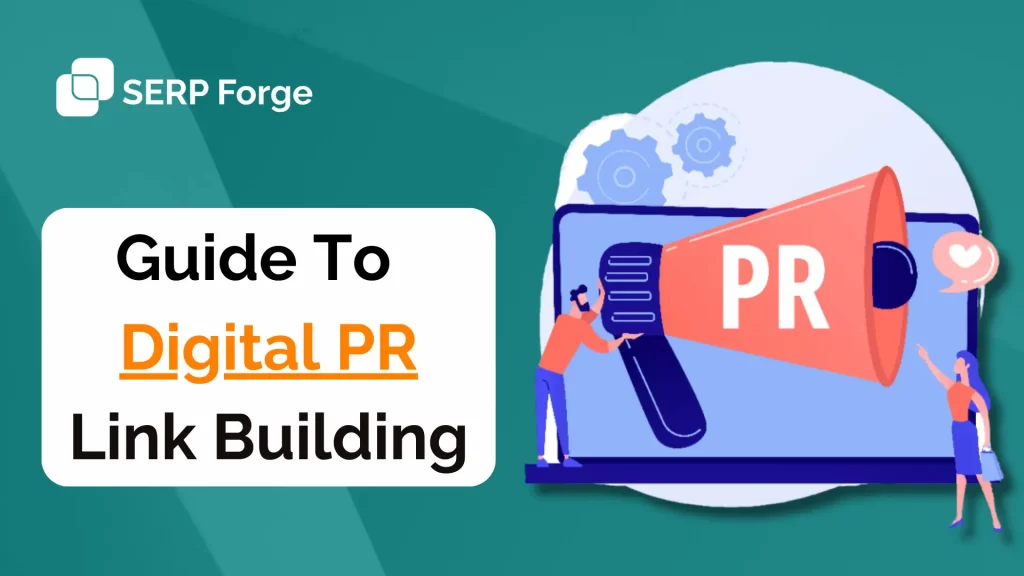Want a specific page on your website to rank higher on the SERP? It needs link juice.
You see, Google is never going to rank a page higher unless it is shown as an authoritative and trustworthy page by other websites. In other words, it has a lot of backlinks coming to it.
Coming back to it, link juice is an extremely important factor that determines the amount of authority a link from another website sends to your webpage.
In this post, you are going to learn what link juice is, why it is important, and how to get more link juice.
Why wait any further? Let’s get started.
What is link juice
Link juice (also called link equity) simply refers to the amount of authority and value a link sends to your website.
As we’ve discussed in our previous blogs, Google considers backlinks as votes from other websites to determine the quality of a website and decide which page is going to rank.
So when a website with higher authority sends a link to your website it passes some of its authority and value to your website with that link, increasing your chances of ranking higher on Google.
Example:
Imagine you have a blog post about healthy recipes and a fitness website that links to your website. This link will act as a vote of confidence from that fitness website to your website.
Now the amount of impact that link brings to your website is called link juice.
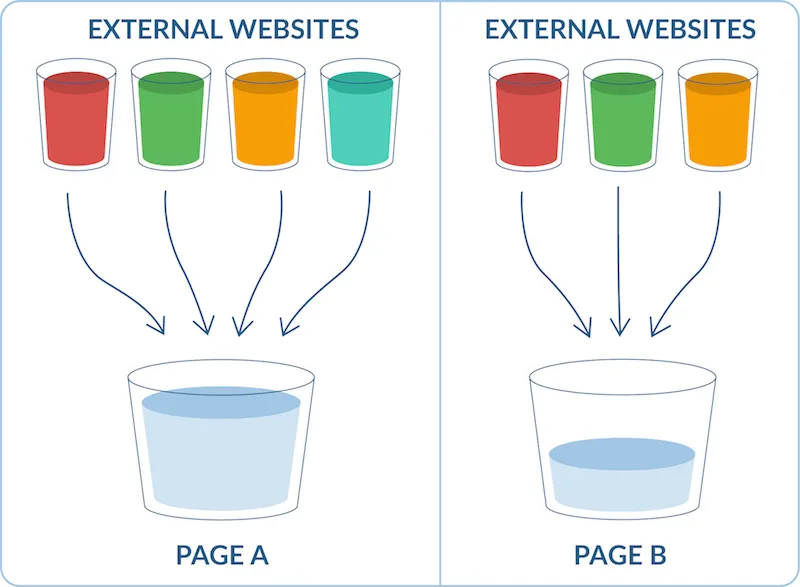
Link juice is the “positive impact” that is passed from that website through the backlink to your website.
External and internal link juice
Now let us understand the difference between external link juice and internal link juice.
What is external link juice
So external link juice is when you add a link on your page to an external website. It is when the link juice is passed to another website.
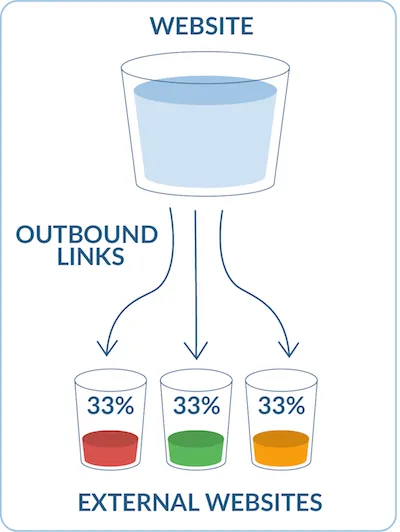
What is internal link juice
Internal link juice when you add a link on your page to your other page. It is when your website’s page A adds a link and passes its link juice to your website’s page B.
How does link juice work
So when a page links to another webpage, it shares a part of its authority with that website through that link (link juice).
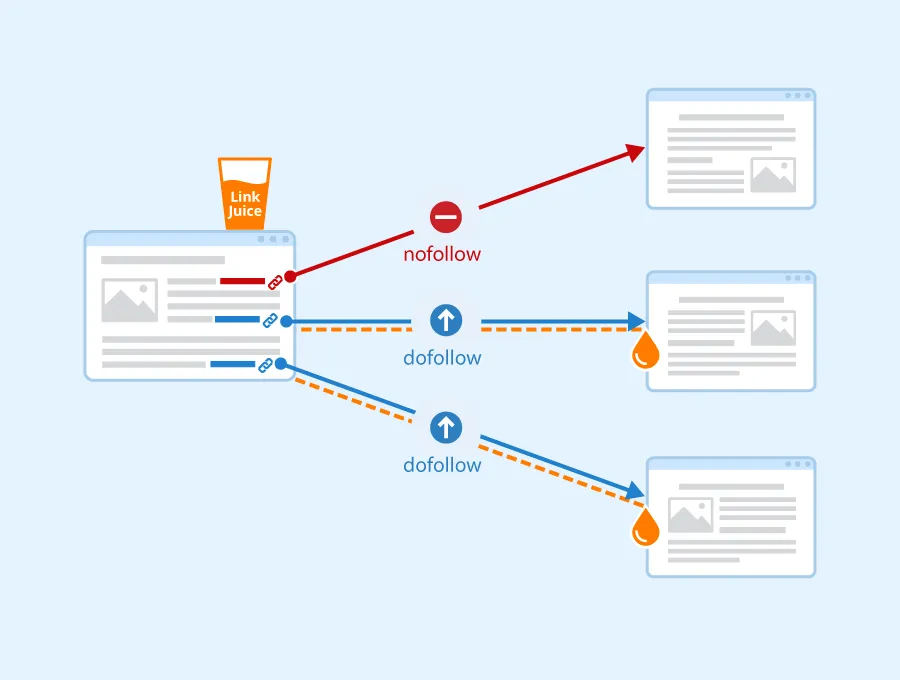
For example, a blog post may have both internal and external links on its webpage. Through internal links, it shares its authority (link juice) with other pages of the same website, and through external links, it passes its link juice to other external web pages.
A blog post with high authority will always share a part of its authority through the backlink to other web pages. That is why having link juice coming from high authority pages is extremely important.
Now let us understand how link juice works.
- The first thing to know is that the amount of link juice a page holds depends upon the links coming to that website.
- If your page is getting links from other high-authority websites that are relevant to your website, it’ll hold more link juice.
- This will help your page build its own authority and rank higher on search engines.
- Next, when that same page links to other pages (internal and external), it passes its authority and link juice to those pages.
Imagine two websites: website A and website B
Scenario one: Let’s say website A receives links from 3 pages and website B receives links from 5 pages.
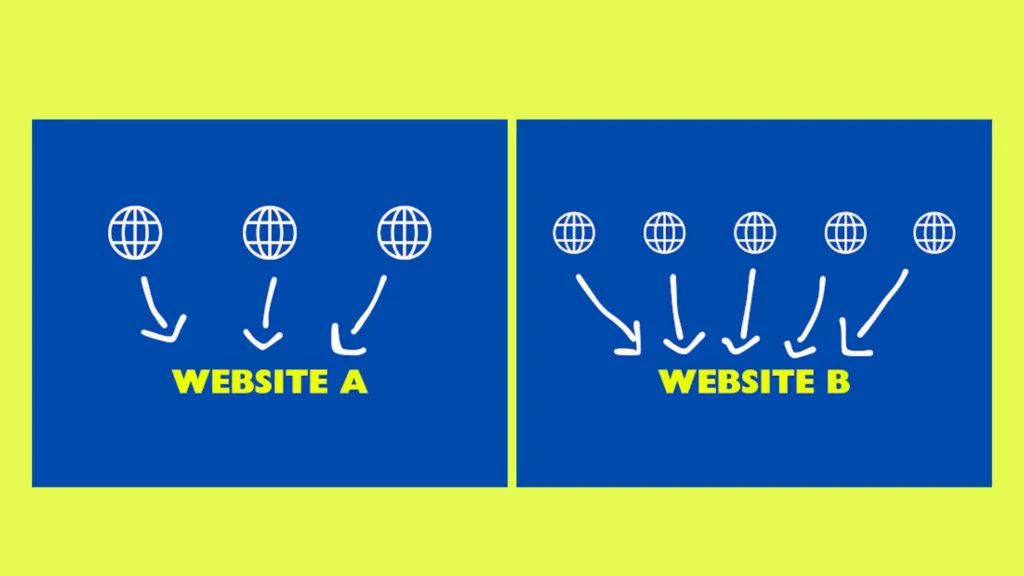
Which website will get higher link juice benefits? Yes, it’s website B. This is because website B has more pages linking to it than website A resulting in more link juice coming to the website.
Scenario two: Let’s say website A receives links from 3 pages and website B receives links from 5 pages. But the change here is that the 5 pages linking to website B are also linking to another website (website C).
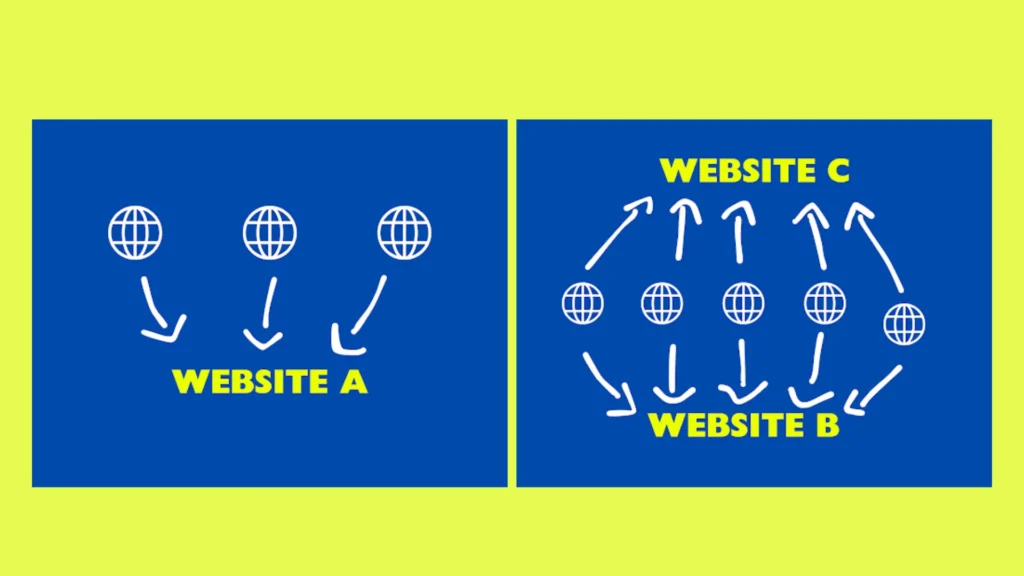
Now which website do you think will get a higher link juice benefit? It’s website A. You see, this is because, unlike the previous scenario, this time those 5 pages linking to website B are also linking to another website called website C. Therefore their link juice is distributed among two different websites.
On the other hand, all the 3 pages linking to website A are only linking to that website. Therefore, they are the sole holder of their link getting a higher link juice to their website.
Why is link juice important
Now let us understand why link juice is important. In other words, the benefits of link juice.
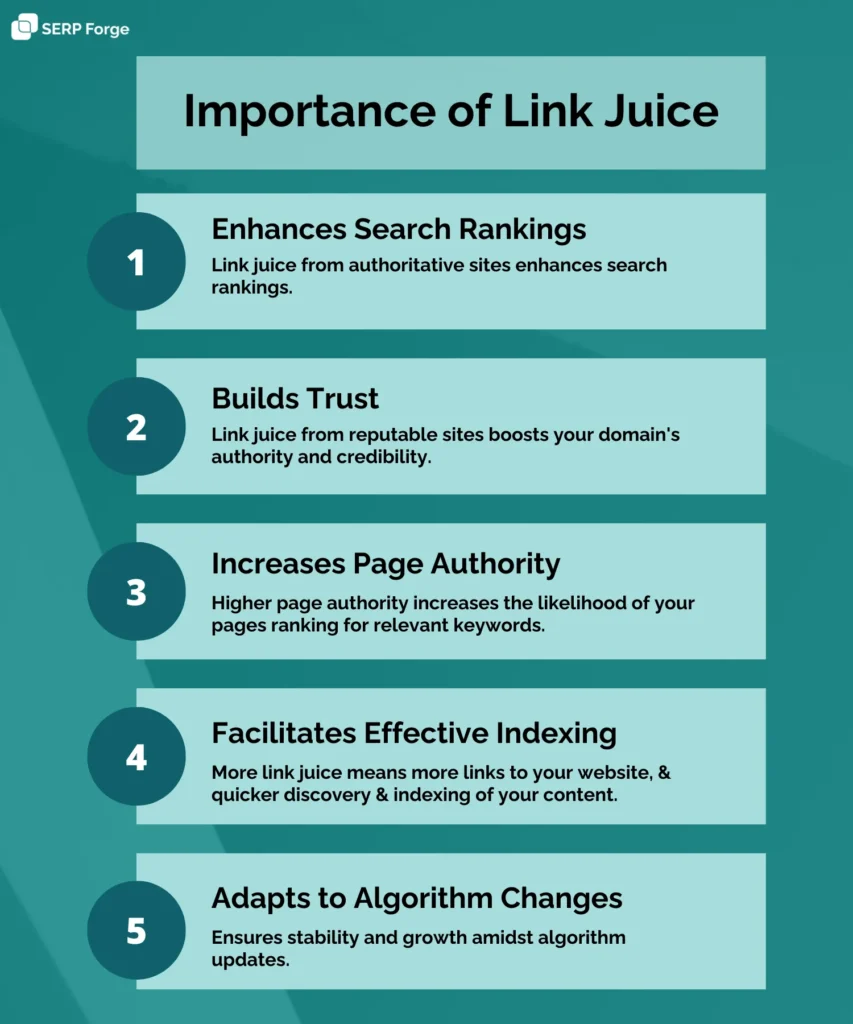
1. Helps you improve your search rankings
Link juice is extremely important if you want to rank higher on search engines.
So let’s say you want your webpage to rank higher on Google. One good way to achieve this is by getting links from relevant and authoritative websites.
When you receive links from external authoritative websites, you get a part of their authority through the link juice shared to your website.
This link juice then helps you build your page’s authority finally leading to a better ranking on search engines.
2. Opportunity to gain trust
Let’s say there are two websites.
Website A has a domain authority of 80 and has several pages ranking higher on search engines with thousands of traffic. Website B has a domain authority of 30 and has fewer pages ranking higher on search engines with very little traffic coming to that website.
Which website in your opinion earns more trust? Obviously website A.
When you receive link juice from external websites with authority and relevance, it gradually increases your domain’s authority, traffic, and rankings.
This overall helps you earn trust and enhance the credibility of your website.
3. Boost your page authority
Let’s say you have a blog on health and fitness and want one of your blog posts to rank for the keyword “best morning exercises”. Now you should know that your page will never be able to rank for that keyword with a low page authority.
High-authority pages are trusted more by Google and therefore have higher chances of ranking on the SERP.
So how can you boost your page authority? Well, the best way to boost your page authority is by receiving link juice from different high-authority websites.
As your page receives more link juice from more websites, it’ll gradually start increasing your page authority. This will overall help your page rank higher on search engines.
4. Effective indexing
What does indexing mean here? Well, effective indexing here refers to the effective discovery, crawling, and addition of new content into the search engine database.
Search engines use crawlers and bots that discover and crawl every page on the internet to add new ones to their database and update the existing ones.
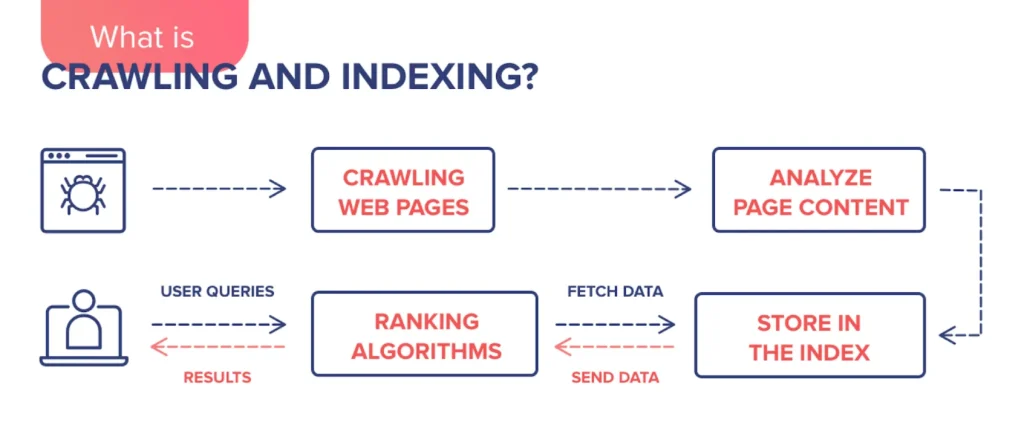
These crawlers use links as their pathways to move from one page to another page on the internet. This is where link juice comes to your benefit.
If your page holds more link juice it means you’ll have more links coming to your website. More links mean more chances of crawlers quickly discovering and updating your webpage.
5. Adapting to algorithm changes
Search engines bring small updates every month. These updates result in huge changes in the environment with some websites losing their position and some websites gaining new positions.
However, if you try to focus on having more link juice to your website you can always withstand these algorithm changes.
What does more link juice mean here? Well, more link juice here refers to having a higher number of backlinks from high-authority and relevant websites.
During algorithm changes, websites with such high authority and relevant links are less likely to face any challenges and are more likely to have stability in growth.
Link juice vs PageRank
Many people still wonder if link juice and PageRank are the same. The answer is NO.
You see, PageRank was Google’s first algorithmic calculation which analyzed a website’s backlinks profile to determine its authority and overall ranking. The idea was simple: The page that had a higher PageRank will rank higher than a page with a lower PageRank.
Though PageRank and link juice are two different things, they still share the same idea. If you get a link from a page with a higher PageRank, it will pass on more link juice.
And the higher link juice your page contains, the higher your PageRank will become.
Factors that affect the amount of link juice passed
Not every link passes the same amount of link juice. One link may pass a stronger link juice while another may pass a weaker one. This depends upon a lot of factors. Let’s discuss them.
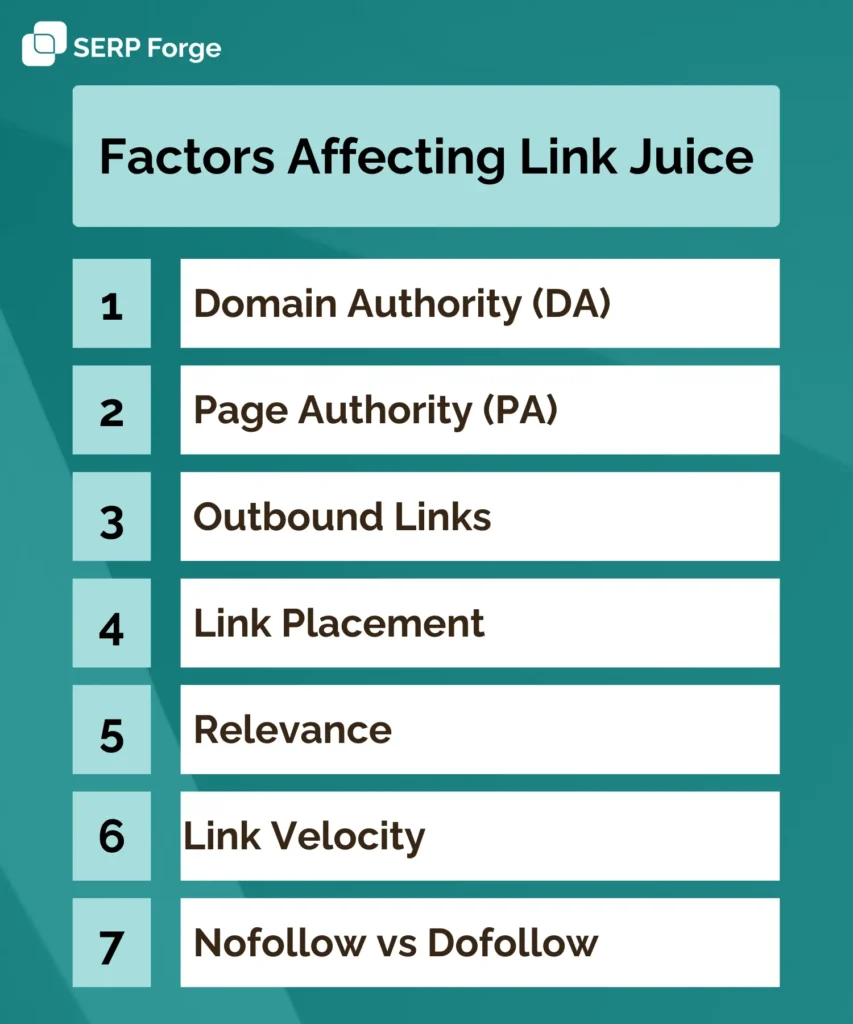
The domain authority of that website
The first factor that affects link juice is the domain authority of the website that is sending the link.
Domain authority is a score that indicates the quality and strength of a website’s domain. A website with a higher domain authority is more likely to be trusted by Google and ranked higher on its result pages.

Therefore, the strength of the link juice depends on the domain authority of the website that is passing it. For example, a website with a domain authority of 80 may pass a stronger authority than a website with a domain authority of just 20.
The page authority of that specific page
A whole website can never link to you. There is always a specific page on that website where your link is placed. The authority shared also depends on the page authority of the individual page sending the link.
An old page with hundreds of links and high-popularity will surely pass more authority than a page that is recently uploaded with a few links pointing to it.
The number of websites it is linking to
Next, the authority of the link juice also depends upon the number of websites that the page is linking to.
If a page is linked to a lot of external websites, you won’t get much link juice from it. On the other hand, if the same page is linked to only a very few external websites, you will get a higher link juice authority.
For example, if a page has linked to only 2 external websites, each website will get 50% of its link juice. On the other hand, if the same page is linked to 10 external websites, each website will only get 10% of the available link juice.
Therefore, the authority passed through a link also depends upon the number of external websites that the page is linking to. I’m sure you got the point.
The location where the link is placed
I don’t know how many of you knew this before, but yeah, the location of the link placement also does matter.
The authority a link is going to pass to your website depends upon the location where the link is placed. Google considers links that are placed in the main body of the text to be more valuable than the links that are placed at the bottom or sidebar of the page.
Therefore, the location where your link is placed on the page also affects link juice.
The relevancy of the link
Next, the relevancy of your link also plays a very important role in determining the power of the link juice.
Links that come from pages that are relevant to your niche are likely to provide higher link authority than the links that come from websites that are not from your industry.
The link velocity
What is link velocity? Well, link velocity is simply the pace at which you are receiving new backlinks to your website.
When it comes to link building, having a natural and gradual pace is always beneficial as it won’t look manipulative to the search engines.
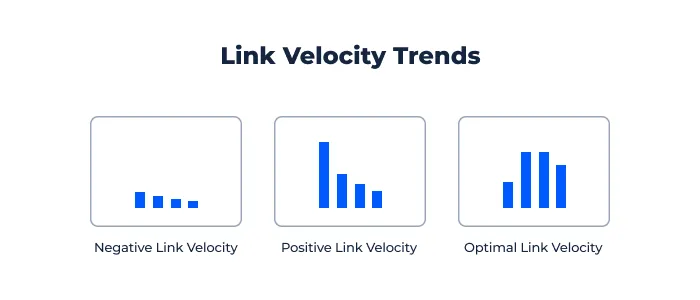
The authority coming to your website from links depends on your profile’s link velocity. If your website is full of sudden jumps and drops in link activity, the new links coming to your website will not be able to provide as much authority as they could bring issues from search engines.
Nofollow vs dofollow
Lastly and most importantly, your link juice can also be affected by the tag they have.
You see, there are two types of links – dofollow and nofollow.
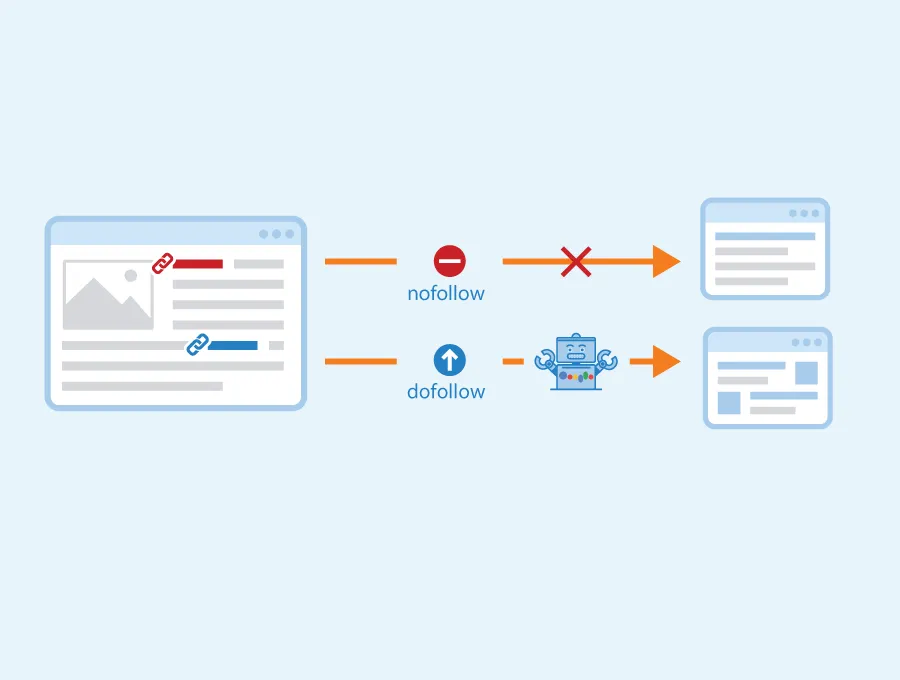
When it comes to earning links, you’ll need to focus on getting dofollow links as they are the perfect forms of links that pass on the link equity.
However, if you gain a nofollow link you won’t receive any link equity from that website. This is because nofollow links include “rel=”nofollow” which basically means that the owner is suggesting Google crawlers to not crawl your website and pass any link equity.
How to get more link juice
What are some effective ways to acquire link juice? Let’s understand.
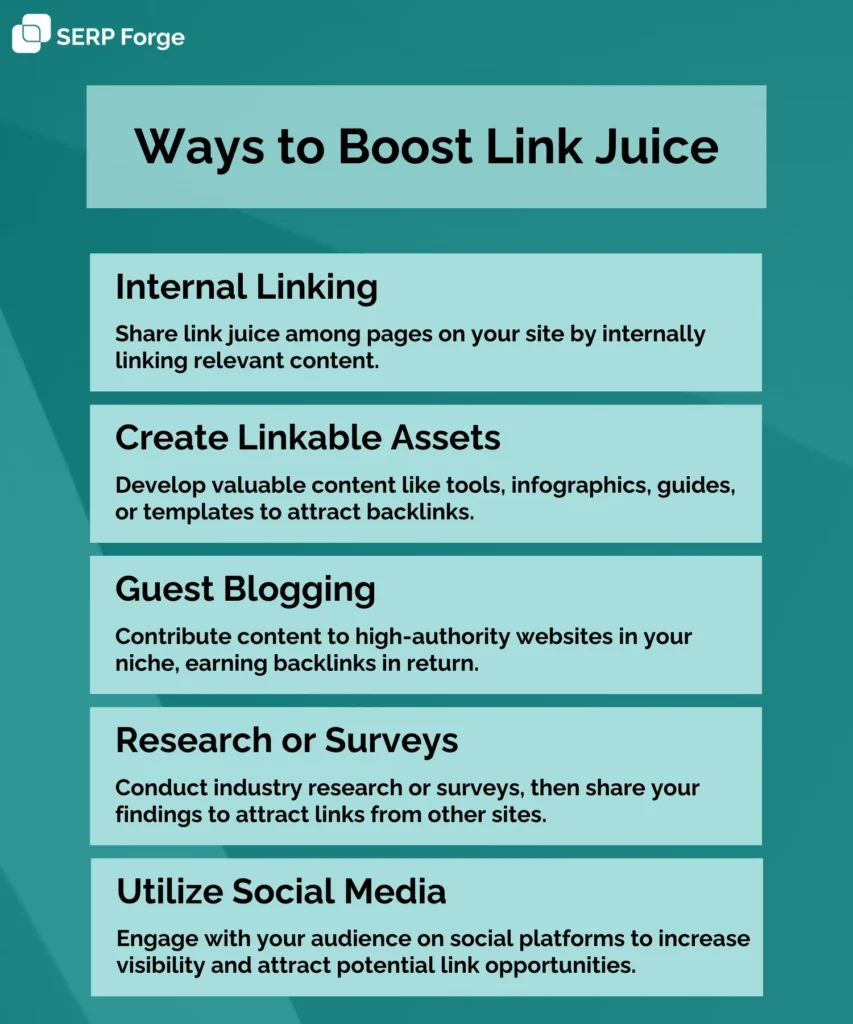
1. Internal linking
Internal linking is one of the best ways to share link juice among pages on your website. Internal linking is when one page on your website adds a link to another page on your website.
This way you can pass your available link authority to different pages.
For example, let’s say page A on your website is a popular page with hundreds of websites already linking to it. Then there is a new page B which contains very few backlinks.
Since page A contains a very powerful link juice authority, you can link that page to page B which will help you pass on some link juice to that new page.
When it comes to maintaining the link juice within your website, your website’s structure matters the most.
Wondering what website structure to use? Well, two of the most popular website structures are – Flat structure and Silo structure.
Flat structure
A flat website structure focuses on keeping links and pages as straightforward and easy to access as possible. All the pages here are close to the root domain and follows an easily navigable structure.

In a flat structure, all the pages linked directly to the homepage get the same amount of link juice from the homepage.
Example:
https://travelxyz.com/paris-tour
https://travelerxyz.com/tokyo-tour
Silo structure
Silo structure, on the other hand, focuses on organizing and categorizing every page into groups and subfolders. The idea is to simply help users and search engine understand the website’s organization.
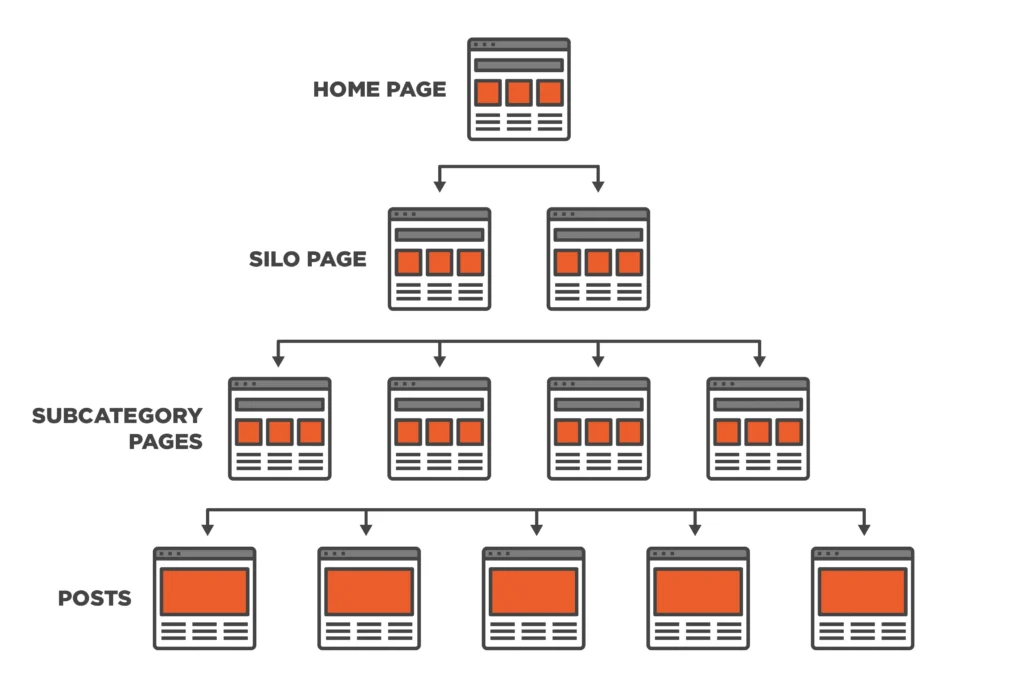
In a silo structure, the link juice is passed from the homepage to the main pages (categories) linked to it. Then, each category passes its own set of link juice to seperate internal links.
Example:
https://travelxyz.com/europe/france/paris-tour
https://travelxyz.com/asia/japan/tokyo-tour
2. Create linkable assets
What does linkable assets mean here? Well, linkable assets refer to things that people in your industry are looking for. Here are some examples of linkable assets that you can create:
- Create and share mini tools for free.
- Pick a complex topic and explain it using an infographic.
- Write ultimate guides on popular topics.
- Provide templates for free.
All of this will encourage other websites to add a link to your pages which will help you get more link juice.
3. Guest blogging
This is another popular way of acquiring link juice from popular websites.
Start with making a list of the most popular websites in your niche. Next, send an email asking them if they would like to get a free guest post from you.
Once accepted, select your topic and start writing the content. Once the job is done, ask them to provide a link to your website on that page.
This way you can utilize the high domain authority of popular websites and get strong link juice from them.
To outsource this entire process consider looking for reliable blogger outreach services.
4. Research or surveys
If done right, this one is surely going to provide you with some very strong link juice to your website.
You can collaborate with industry experts and conduct research and surveys on a popular topic of your industry to bring out new findings.
You can then share your findings in statistics and data form through reports.
If your research and survey bring out some interesting findings, it will encourage other websites to link to your reports.
5. Make use of social media
Social media can be an indirect medium to provide you with strong link juice. Let’s discuss how.
When you post unique and engaging posts on social media platforms, it engages the audience and encourages them to like, comment, and even share your post with others. This results in an increase in followers.
Once you have enough followers and have gained some popularity, it will become even easier for you to get discovered by other popular businesses in your niche.
This will then encourage them to visit your website, explore your content, and link to it if they like it.
Additional tips
Now that we are coming to the end of this post, let’s learn some additional tips that can be helpful for you when trying to earn link juice.
1. Try to optimize your anchor text effectively
The impact of link juice also depends upon the kind of anchor text that is used for your link. The anchor text is how search engines are going to see your content.
If your anchor text contains keywords that are relevant to your content, you are more likely to get additional link juice benefits from it.
However, it’s also important to never over-optimize your keywords. This will lead search engines to mark your website as spam and lead to penalties.
2. Keep an eye on your competitors
Next, you must also try to keep an eye on your competitors and monitor their link profiles to analyze all the links coming to their sites, the amount of impact they have, and the websites that are sending those links.
This will help you find new link opportunities and get more link juice from other websites.
3. Prioritize quality over quantity
Remember, when it comes to backlinks, the quality of those backlinks is far more important than the quantity of those backlinks.
5 high-quality backlinks can provide you with more link juice authority than 10 low-quality backlinks. That’s why you must always focus on maintaining the quality of the backlinks that you earn.
Conclusion
So that’s it for today!
In this post, you’ve learned about what link juice is, why it is important, how it works, and how to get more link juice.
Now that you know how important it is to bring link juice to your website, it’s your turn to take a step and start building your website’s backlinks and getting link juice today.
Don’t want to risk your website’s link building? Consider working with a specialized link building agency like SERP Forge. We provide expert backlinks building services at an affordable price. Contact us today and start getting more link juice.
FAQs
-
Can link juice be harmful?
Yes, if you don’t do it carefully. When it comes to backlinks, you’ll need to be very careful with the kind of backlink that you earn for your website. While an authority backlink from a high-quality website can provide strong link juice, a low-quality backlink, on the other hand, can pass bad link juice which can affect your SEO.
-
Is the quantity or quality of backlinks more important for link juice?
The quality of the backlink usually carries more weight than the quantity of your backlinks when it comes to the link juice passed. Five backlinks from high-authority websites are always going to provide more value than ten backlinks from low-authority websites.
-
Are nofollow links relevant for link juice?
While it is true that a nofollow link does not carry any link authority or pass any link juice to your website, it is still beneficial to have some of these links. This is because even though nofollow links do not pass any link juice, they can still be helpful in providing referral traffic, improving credibility, and so on.


